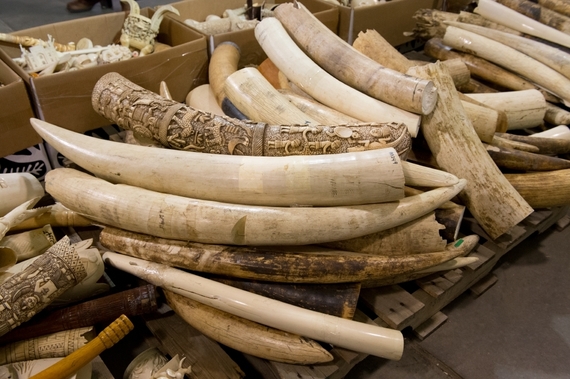Ivory and pianos were once so inseparable that pianists were said to be "tickling the ivories." Yet when the world renowned piano maker Steinway stopped capping its keys with ivory in 1956, the classical music field did not come crashing to a halt.
Indeed, the high-quality plastics that replaced the material from tusks of slaughtered elephants were superior in many ways. They did not yellow, curl or crack. Today they are found on the pianos of our most famous classical pianists.
While Steinway, Baldwin and other piano manufacturers abandoned ivory six decades ago (mainly for economic reasons), the mass killing of elephants for their tusks sadly continues today across Africa.
African savannah elephants, Kenya. Photo by Julie Larsen Maher © WCS.
As a wave of poaching by organized criminal syndicates has pushed the number of elephants killed in Africa today to a rate of some 35,000 per year, or 96 each day, many in New York and across the United States have been coming to the conclusion that something needs to be done.
Concern by New Yorkers has led Assemblyman Robert Sweeney to propose legislation in Albany to ban the sale and trade of ivory. The bill's passage would be a tremendous show of leadership in the fight to save elephants while supporting the wishes of legislators' constituents.
According to a recent statewide survey, more than 80 percent of all New Yorkers are in favor of a permanent ban on ivory sales. New Yorkers are steadfast in this belief. Even when respondents were presented with opposing arguments that a ban would affect auction houses and antiques dealers, along with the rights of private property owners, their support remained strong.
In May 2013, rebel forces entered the Central African Republic's Dzanga Bai clearing and killed more than two dozen forest elephants for their ivory. Photo by Mike Fay © WCS.
In this case, it so happens that the popular decision is also the right thing to do. A WCS-led study published last year found that a staggering 65 percent of all forest elephants have been killed for their ivory over the past decade. At that rate, Wildlife Conservation Society scientists believe they may be extinct in the wild within the next decade.
The trade will not let up until ivory is devalued on the open market and a key component to achieving that goal is to ban ivory sales and continue to clamp down on the black market.
The David Sheldrick Wildlife Trust Orphans' Project in Nairobi, Kenya rescues young African elephants, many of whom lost their mothers due to poaching. Photo by Julie Larsen Maher © WCS.
This is an issue that cuts across all social lines. According to the poll, support for the ivory ban is strong among all age groups, genders, and regions of New York State. And perhaps most importantly, the support transcends political party affiliation.
That support will be critical as the New York State Assembly considers the Sweeney bill. The success of the legislation -- as well as the fate of the Obama Administration's recently announced tightening of a federal ban on domestic ivory -- hinges on the support of politicians and constituencies on both sides of the partisan divide.
This stockpile of confiscated ivory was destroyed by the U.S. Fish and Wildlife Service in November 2013. Photo by Julie Larsen Maher © WCS.
Thankfully, through efforts in Washington and the WCS-led 96 Elephants campaign, we have seen Americans and leaders of all stripes come together to show support for this cause.
Nevertheless, even with more than three-quarters of New York voters firm in their belief that the African elephant faces the threat of becoming extinct in the next 10-20 years, it will require ever greater public pressure to accomplish something as momentous as an ivory ban.
When Steinway and its fellow piano makers made their decision to move on from ivory, the music did not stop. If we can end the commercial ivory trade, life will likewise go on for us and -- just perhaps -- a wondrous and irreplaceable species.




